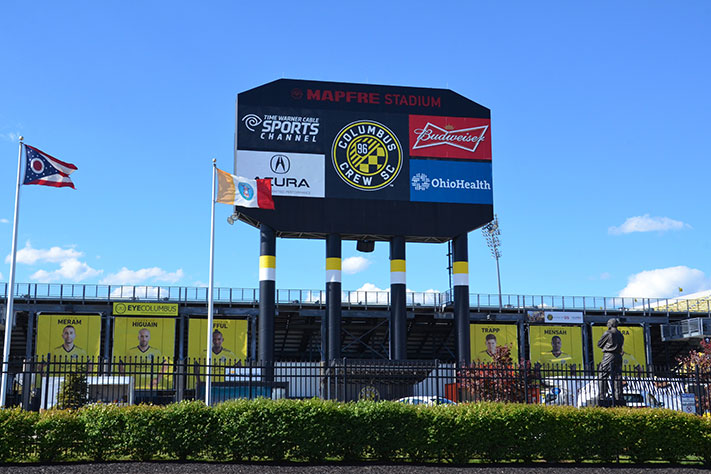Columbus Crew Appeals Trial Courts Decision

Several of my earlier posts (Can The Columbus Crew legally relocate? , Can The Columbus Crew legally relocate? Part 2 , and State of Ohio and City of Columbus sue the Columbus Crew) have addressed the potential move of the Columbus Crew soccer team to Austin, Texas. There have been several developments in recent weeks.
First, the City of Columbus and State of Ohio (the plaintiffs in the lawsuit against the Crew and Major League Soccer) moved to pause the six-month window under Ohio Revised Code Section 9.67 (the “Modell Law”) during which the Crew is supposed to give local investors a chance to make an offer to purchase the team. The plaintiffs argued that the six-month period would likely expire before the trial court had a chance to determine whether the Modell Law even applied to the Crew. Thus, if the Crew relocated prior to the trial court deciding the applicability of the statute, the plaintiffs would be left with no remedy.
The Crew opposed that motion, moved to dismiss the case, and moved to stay discovery until the trial court had an opportunity to rule on its motion to dismiss. The Crew argued that the Modell Law was not applicable to it, but even if it was, that the law was unconstitutional for a variety of reasons.
On May 8, 2018, the trial court issued an order pausing the Modell Law’s six-month window for 90 days to allow the parties to discuss resolution. In particular, the trial court stated that it would conduct separate meetings with the plaintiffs and the Crew to determine what constitutes a bona fide purchaser, and whether any other conditions were necessary in soliciting offers to purchase. The judge further required all purchase offers to be submitted to the court. The court did not rule on the merits of the case, and specifically did not determine whether the Modell Law applied to the Crew.
The trial court also stayed discovery, noting that pausing the six-month window went hand-in-hand with delaying the parties’ discovery obligations. The purpose of the stay is, presumably, to conserve the parties’ resources during a short window while the Crew solicits bids from potentially interested purchasers.
The trial court’s decision was widely viewed as a win for the plaintiffs. This notion was further reinforced when the Crew appealed the decision.
The general rule is that a trial court order is not appealable unless it is a final judgment—i.e., it disposes of all claims against one or more parties. Ohio Revised Code Section 2505.02 provides that a non-final order can be appealed where it affects a substantial right of a party, such as where a party would be left with no appropriate remedy if not allowed to appeal immediately.
For example, a trial court decision that ordered a party to disclose potentially privileged documents might be appealable, particularly where the prejudice of turning over the documents would result in damage that could not be undone. If the aggrieved party was required to turn over the documents and wait until after the case was finally resolved to appeal that decision, the damage may have already been done. Instead, by allowing that party to appeal immediately, the appellate court can issue a ruling before the party needs to turn over the documents. If the trial court’s decision was correct, the party will be ordered to turn the documents over anyway. But if the trial court erred in ordering the documents be turned over, then the aggrieved party benefited from being able to appeal prior to disclosure. This right to interlocutory appeal is generally quite limited.
The plaintiffs moved to dismiss the Crew’s appeal, arguing that the trial court’s May 8 decision does not fall within the limited category of orders capable of immediate appeal. In particular, the plaintiffs noted that the trial court has yet to decide whether the Modell Law even applies to the Crew, and if so, whether any violation occurred. Once the trial court reaches a decision on the merits of the case, the Crew will have every opportunity to pursue their appellate rights. Given those facts, the plaintiffs argued that the appellate court should dismiss the appeal and send the case back to the trial court.
The Crew responded to the plaintiffs’ motion to dismiss, arguing that the trial court’s ruling prevented it from taking any steps to make relocation possible. Despite arguing as much, the Crew has indeed pressed forward with taking steps toward relocation, such as by meeting with Austin city officials, releasing a stadium rendition, and preparing a 189-page report detailing the economic and logistical details of a potential move to Austin.[1] On June 8, the Crew filed its merits brief in the case.
As of this writing, the appellate court has not issued a decision. It has a couple of options available. First, it could rule on the motion to dismiss without holding an oral argument. Second, it could request an oral argument at which the parties will discuss the pending motion to dismiss. An oral argument could also include a discussion of the merits of the appeal, rather than just the jurisdictional issues identified in the plaintiffs’ motion to dismiss. Depending on the scope of the oral argument, the court could rule on the motion to dismiss and then (if the motion is denied) request further argument on the merits of the appeal.
The trial court case is on hold while the appellate court hears the case. It is expected to move along quickly, as both sides have requested an expedited resolution, and the Crew is under a time crunch because it hopes to have a final decision on relocation in the coming months.
Written by Attorney Gerrod Bede
[1] See, e.g., http://www.dispatch.com/news/20180531/crew-sc–precourt-releases-renderings-of-stadium-at-mckalla-place-in-austin; https://www.statesman.com/sports/soccer/precourt-offers-more-details-mls-stadium-proposal-new-report/mbIyVkC4y24QuVfMeN3mkK/.